What is an SEO keyword list?
It’s no secret that for SEO (search engine optimization) to work, you need good keywords. SEO keyword lists act as blueprints for SEO (like what sitemaps are to websites). They are composed of lists of keywords or keyword phrases. These keywords are nothing more than words or phrases your prospective customers are likely to use in order to find your site on Google or other search engines. Once you have identified your potential customers’ most searched words or phrases in relation to your brand or business, you’ll have your keyword list! Doesn’t that sound easy?
An SEO keyword list makes it possible to know which content to put on your site and the following paid marketing tactics you can use to drive traffic to your site. On top of that, SEO keyword lists also have a key role when creating your different strategies, they can, for example, specifically inform your website content strategy in terms of link building, social media marketing, and more.
We bet this all sounds great and you must be eager to know your company’s particular keyword list, but not so fast! Where should you begin? Do you already have your keywords ready? If not, how do you know what your potential customers want? There are many steps and questions to answer before you can have your own keyword list, so let’s dive into them and get you ready to start:
How to know which keywords you should rank for?
If you don’t select the right keywords for your SEO campaign, most website marketing efforts won’t matter. Those who overlook SEO keyword lists may also spend countless resources and time trying to re-optimize their website content without getting great results. Therefore, the importance of getting it right initially can’t be overstressed.
Luckily, we’ve prepared a step-by-step guide below to ensure you know which keywords you should be focusing on from the start:
Step 1: Brainstorming
This is the first step to establishing which keywords you should have on your site. To begin with your research you can think of words that directly relate to your business. For example, if you own a pet store in The United States, you can start by researching “cat food”, “dog toys”, “fish tanks”, etc.
Another way to start is by brainstorming words based on your target location. Given that every business has a target customer, you can begin by asking yourself if your site is targeting customers from a small town, a large city, or maybe from the entire country, that is: if you only own one pet store in your area, if you have a few locations scattered across your city, or if you have multiple locations through the country. The difference will inform how specific your keywords should be. For example, for a small town, you can probably get away with “affordable cat food”; you’ll need to be more specific for a large city, with keywords like “affordable cat food near Georgia (or any specific area)” or “best dog products in North Carolina”; for a nationwide search, however, it can get trickier than that.
Once you understand the scope of your audience, it will be easier to know the search volume you can target with your keywords. For instance, an entire country has an enormous population, which means the keywords that will be relevant to those millions of people will have a high search volume. Having a high search volume is not necessarily the best situation, but it will entirely depend on your business’ size. A huge company should have no problem ranking for the high-volume keywords, given its strong online presence, but a smaller business will not have that same outcome. If you are not a huge business and realize your keywords have a high search volume, you will need to opt for highly specific keywords in order to increase your chances of beating the competition and enjoying high search engine rankings.
Let’s see another example: Assuming you do iPhone repairs, you should choose a keyword that is specific i.e., “iPhone screen repair” or “iPhone battery replacement” over a broader keyword like “iPhone repair”, which is bound to be more competitive. When the target is a large city like Toronto, you can be specific and use a keyword phrase like “Toronto iPhone repair” or “iPhone battery repair in North York, Ontario”.
When targeting a small town that has few people and therefore low competition for targeted keywords, you can choose a broader keyword like “Stratford Apple repair”.
In a nutshell, the larger the target market, the more specific your primary keywords should be. So start thinking of words that are directly related to your business and that you think your potential customers might be searching for, and save them for the next step.
Step 2: What are people searching for?
Armed with some keywords from step 1, it’s time to discover what people are searching for or their search intent. Luckily, there are keyword search tools you can use, like Google Autocomplete. This tool, which is within Google Search, makes it easier to finish searches by generating predictions. You can use your keyword phrases from step 1 to get relevant topics from Google and save time.
For instance, type “Toronto” followed by “iPhone repair” to get more keyword phrase variations.
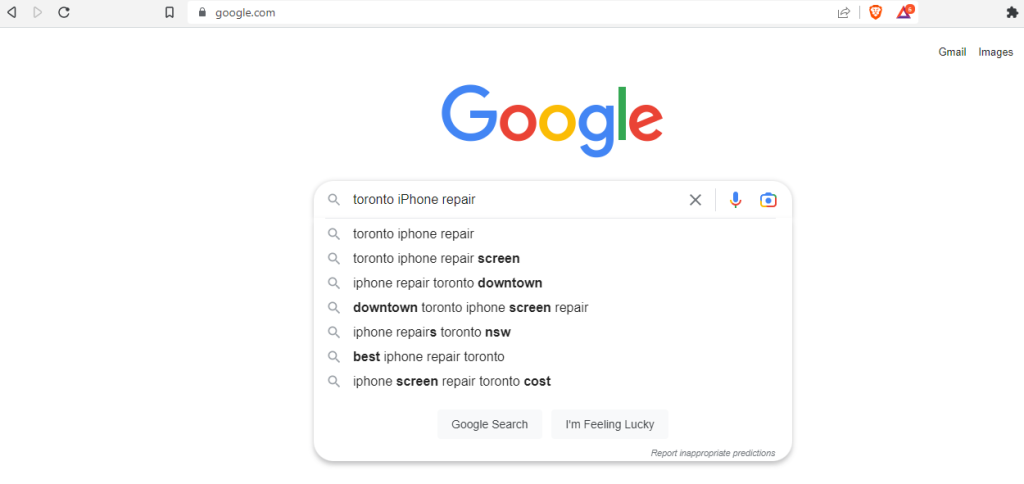
Do this for broad, specific, or very specific keywords and get the most popular phrases. The same should be done for different website pages with location-specific keywords and different products/services.
Start your keyword research
The above steps should reveal the searcher’s intent and many keyword alternatives to consider, so your potential keyword list must be looking pretty strong.
Now, it’s time to see how competitive those keywords really are:
Can you search for trending keywords?
There are SEO tools you can use to check the competitiveness of a keyword or keyword phrase, such as Google Ads Keyword Planner. Google Trends is also great for checking trending keywords.
These tools let you discover competitive and popular keywords as well as their search volume. This information is critical when selecting the exact keywords you will use. Ideally, you want short-tail and long-tail keywords that have high search volume data but low to moderate competition. Highly competitive keywords with a high search volume are harder to rank for.
Your competitive research will show you that keyword phrases like “iPhone repair” are highly competitive nationally. In fact, common sense dictates that there will be countless sites already trying to rank for such keyword phrases. However, “iPhone battery replacement in Stratford ” will be less competitive since it targets a specific place in Toronto.
These are the kind of keyword phrases you want to focus on when creating content (such as a blog post) for your website. You have a better chance of ranking on the first page of Google’s organic search results (SERPs) with such keywords. Remember, it’s better to rank on page one for a search term with low searches than rank on page 10 for a term with 1,000 searches monthly. The focus should be on identifying profitable keywords.
Branded keywords vs. Non branded keywords
As part of your research, it also helps to understand the two main categories of keywords that can benefit you while creating the best SEO keyword list possible. In this regard, the keyword categories include:
Branded keywords
These are keywords with your brand name in them. It’s worth noting that your site may not be #1 on Google for your brand name. This is usually the case for businesses with generic brand names or names similar to other brands. The same applies to businesses operating in highly competitive niches. For instance, if your business name is Toronto iPhone Repair, there may be sites ranking higher than yours. It helps to have a unique brand name and include such a name in the short-tail and long-tail keywords. It’s also prudent to track your brand name using notification tools like Google Alerts, which lets you know every time your brand or related terms (like product names) are mentioned online in blogs, forums, etc. This is more efficient than Googling your brand. Google Alerts can offer many relevant keywords and keyword ideas.
Non-branded keywords
These are keywords that are already being used by your customers and already drive organic traffic to your website. You can use Google Analytics – Google Search Console to find the exact keywords that bring customers to you organically. In most cases, these are several keywords, and most are likely to be related to those you’ve come up with while brainstorming in step 1. However, you may find new and surprising keywords which you should include in your final list of target keywords.
Find your competitor’s keywords
As part of competitive keyword research and creating effective SEO strategies, it helps to “spy” on your competition and find out which keywords they are using as well as their performance with them. This is particularly helpful when trying to create an SEO keyword list for a niche that is highly competitive.
The idea is to discover the keywords that drive search traffic to your competitor’s site, whether through organic search or paid search campaigns like Google Ads. Thankfully, there are many tools for establishing competition levels.
Here are our top picks:
Best keyword searching tools
1. WordStream
WordStream’s free keyword tool is great for those searching for free keyword searching tools that are simple to use when researching new keywords and keyword performance data to use on website content, Google Ads, and more. You simply need to enter your competitor’s URL or keyword to get keyword suggestions.
Here’s an example of a keyword search for “iPhone battery replacement”:
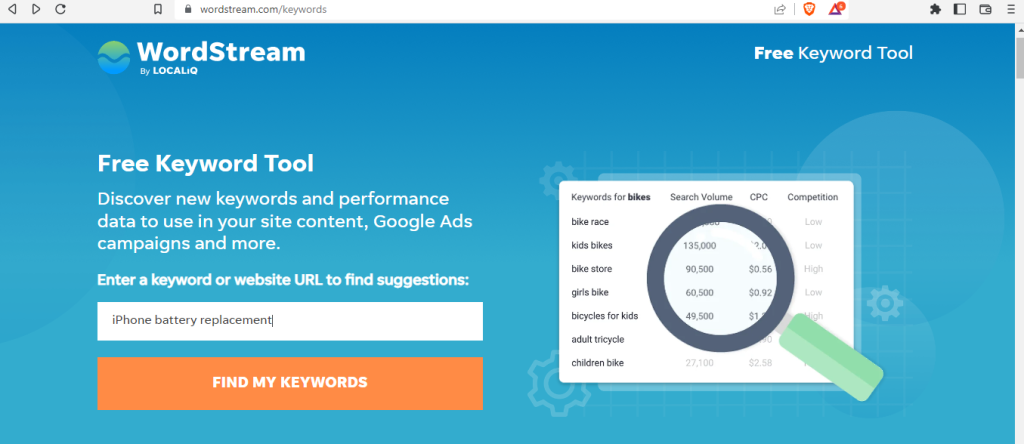
The tool will prompt you to refine your search
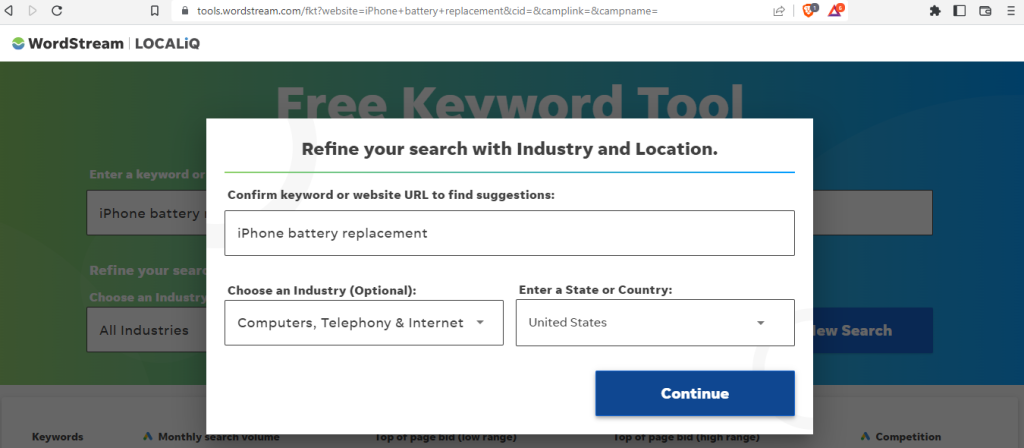
Here is the result indicating the keyword variations, monthly search volume, keyword difficulty score (high, medium, or low), and the Google Ads bids:
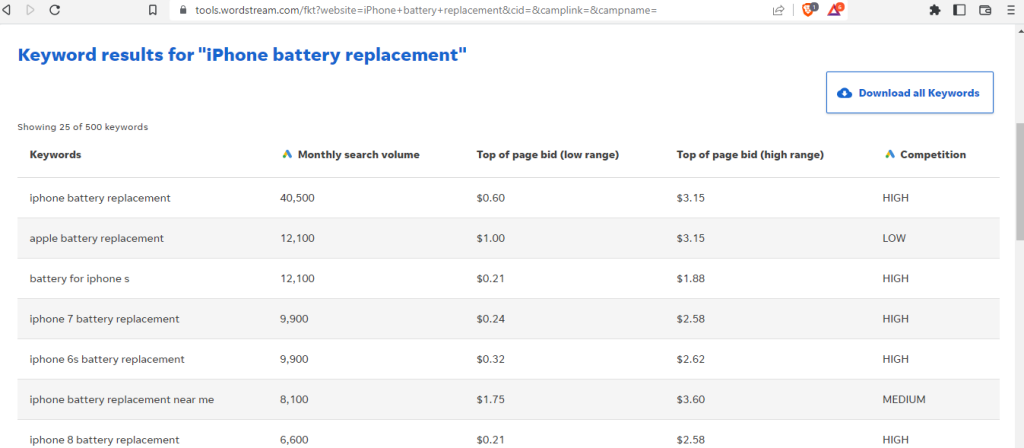
2. BuzzSumo
This is a paid keyword research tool. However, you can access the trial version with limited features. Using this tool’s free version is as easy as typing in your keyword phrase and waiting for the results.
To continue with the example we have been using, we found one competitor for the term “Toronto iPhone Repair”: computerstar.ca. You need the paid version to see more data i.e., past year, past two years, past 5 years, etc., and access other info such as backlinks, domain authority, and more. Nevertheless, you can at least get an idea with this trial version.
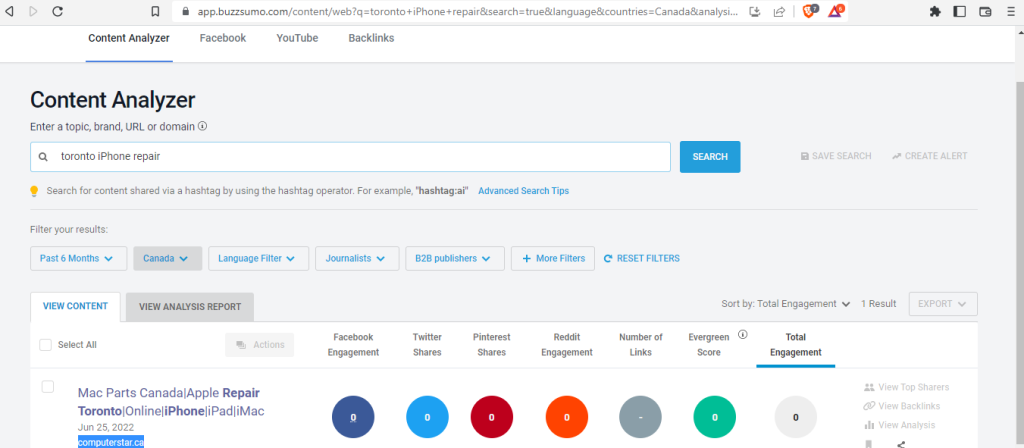
3. Google Auction Insights
Keyword research tools like Google Auction Insights come in handy for SEO keyword lists when used in Google Ads campaigns and other efforts requiring a foolproof keyword strategy. If you want to run an effective Google Ads campaigns that can be a real game changer for your SEO strategy, while meeting your SEO goals, Google Auction Insight reports will help you discover the other advertisers (competitors) participating in similar auctions.
Remember, Google has auctions to decide the ads that appear for specific search terms (keywords) and the order in which such ads show up on SERPs. Google Auction Insight reports can be generated based on individual or multiple keywords, ad groups, and other parameters. However, you need a Google Ads account to take advantage of this free tool and its reports.
By now you should have a solid idea of how to conduct your own keyword research so that you can build a keyword list that is bound to help your business rise to Google’s top organic search results, so we hope you feel confident enough to jump right into this new possibility! If you are still unsure or, on the other hand, have realized there really is a lot that goes into this process, don’t worry, you still have some options.
Can you buy keywords from professionals?
The quick answer is no. But you can, however, hire a keyword research service! We wish there could be an easy way for you to buy some keywords and get it over with fast, so you can start to rank for them and watch as your SEO surges through the roof but, sadly, there is no such thing. Easy fixes never quite really work.
The proper research process to create a solid, foolproof keyword list that will guarantee your business’s success on Google’s search results is no ordinary task. We understand firsthand how time-consuming this can be, but we still believe you are totally capable of attempting this on your own!
However, let’s not kid ourselves, you probably have a lot on your plate as it is. Chances are you are running your own business, figuring out how to create your marketing strategy, and working hard toward improving your brand’s online presence, among many other things. If this sounds familiar then time is a valuable currency for you, and we don’t want you to waste any of it. Allow us to give you a hand!
Thorough keyword research is just the tip of the iceberg of our comprehensive SEO campaign, which is specifically designed to boost our client’s online presence, get them more leads and customers, and even rank on Google’s organic top search results, among many other benefits. We have a dedicated team of experts that will gladly build you a custom-made strategy and tackle your company’s every need.
We happen to be SEO specialists, with a deep understanding and firsthand knowledge of many aspects of creating a complete SEO strategy, with keyword lists being an important factor but certainly not the only one. We also run Google Ads campaigns using highly competitive keywords, optimize our clients’ entire websites to better their ranking, on top of constantly updating their digital marketing strategy.
If this sounds like exactly what you were looking for then you can visit our website to find out more. You also have the option to book a FREE consultation, where we can discuss all of your company’s needs, what potential keywords could work best for you, what your SEO strategy currently looks like or even build one from scratch, together. Let’s not waste any more of your valuable time!
Frequently Asked Questions
How do I create an SEO keyword list?
Start by brainstorming words that directly relate to your business or are based on your target location. Once you understand the scope of your audience, it will be easier to know the search volume you can target with your keywords. The larger the target market, the more specific your primary keywords should be.
How do I find my popular keywords for SEO?
There are SEO tools you can use to check the competitiveness of a keyword or keyword phrase, such as Google Ads Keyword Planner. Google Trends is also great for checking trending keywords. Ideally, you want short-tail and long-tail keywords that have high search volume data but low to moderate competition. These are the kind of keyword phrases you want to focus on.
How do I find my competitor’s keywords?
Analyzing your competitor’s keywords is a great way to start working on your keyword list. To do so, you can check out WordStream, BuzzSumo, and Google Auction Insights. However, if you are not that tech-savvy then we recommend you hire professional help to get you started on this SEO journey. Although these tools can be free to use, their true advantage will be well beyond simply knowing the search volume of certain words: the key will really be on a thorough SEO strategy that takes a keyword list as a starting point and is able to create something much bigger and thorough from there.





